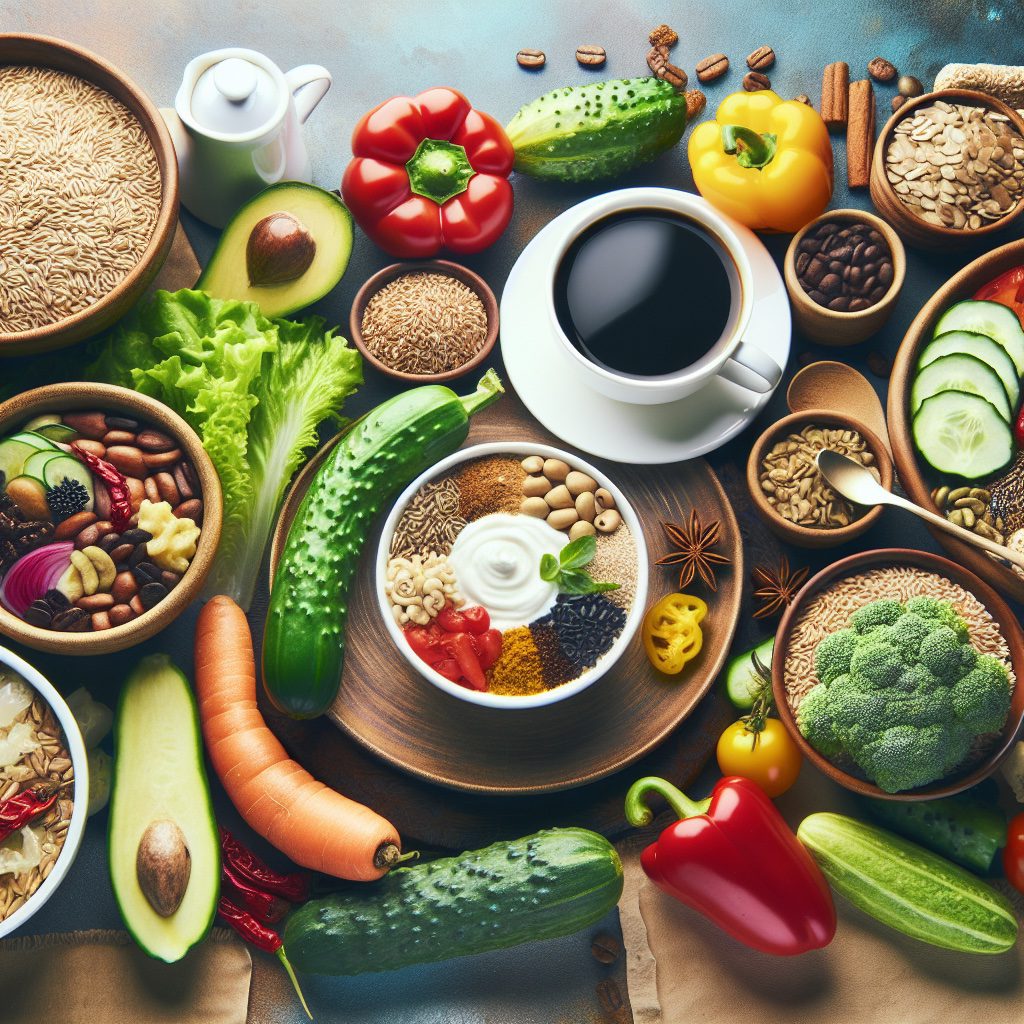Ever notice how that afternoon coffee or energy bar gives you a quick boost but leaves you crashing an hour later? You’re not alone. In our fast-paced world, we’re constantly searching for foods that provide lasting energy—not just a temporary jolt that sends us spiraling into exhaustion later.
What if I told you that ancient Eastern medicine has been solving this energy puzzle for thousands of years? Long before energy drinks lined supermarket shelves, Eastern healing traditions developed sophisticated systems for understanding how foods affect our vitality and stamina throughout the day.
These time-tested approaches to what to eat for energy aren’t about quick fixes. Instead, they focus on creating sustainable energy by working with your body’s natural rhythms rather than against them. Let’s explore how this ancient wisdom can transform your modern day energy levels without the dreaded crash.
The Yin and Yang of Energy: Balance Is Everything
At the heart of Eastern nutritional philosophy is the concept of balance—specifically, the balance between Yin and Yang energies. This isn’t mystical mumbo-jumbo but a practical framework for understanding how different foods affect our bodies.
Yang foods are warming, energizing, and stimulating. They tend to be dense, colorful, and grown in sunny environments. Think ginger, chili peppers, and most animal proteins. While these foods provide immediate energy, consuming too many can leave you feeling overheated, agitated, or unable to relax.
Yin foods are cooling, calming, and moistening. They’re often grown in shadier environments and have higher water content. Examples include cucumber, watermelon, and many leafy greens. Too many Yin foods can leave you feeling cold, lethargic, or spacey.
“The goal isn’t to eliminate either Yin or Yang foods,” explains Dr. Ming Chen, a practitioner of Traditional Chinese Medicine. “Instead, we aim for balanced body foods that provide sustainable energy by harmonizing these opposing forces.”
This balance varies person to person and season to season. During hot summer months, your body naturally craves more cooling Yin foods, while in winter, warming Yang foods help maintain your energy and warmth. By tuning into these natural cycles, you can maintain consistent energy levels without artificial stimulants.
5 Balanced Body Foods for Sustained Energy
Based on Eastern dietary principles, here are five surprising foods that can power your day without causing an energy crash:
1. Millet: The Forgotten Superfood
This tiny ancient grain rarely gets the attention it deserves in Western diets. In Eastern medicine, millet is considered a perfectly balanced food that strengthens the spleen and stomach—organs responsible for transforming food into energy in Traditional Chinese Medicine.
Unlike refined carbohydrates that spike blood sugar, millet releases energy slowly throughout the day. Its slightly sweet flavor and hearty texture make it perfect for morning porridge seasoned with warming cinnamon and dates. This simple breakfast provides steady energy without overtaxing digestion.
2. Sweet Potatoes: Nature’s Long-Lasting Battery
Sweet potatoes are considered a perfectly balanced food in many Eastern traditions. They contain complex carbohydrates that break down slowly, providing sustainable energy throughout the day.
“Sweet potatoes nourish the spleen-pancreas system,” explains nutritionist Sarah Lin. “In Eastern medicine, this organ system is crucial for generating energy from food. When we strengthen this system with the right foods, our natural energy improves dramatically.”
Try steaming sweet potatoes rather than baking them to preserve their moisture balance and vital nutrients.
3. Astragalus Root: The Energy Adaptogen
While not strictly a food, astragalus root (known as Huang Qi in Chinese medicine) has been used for centuries to boost energy levels naturally. This powerful adaptogen helps your body respond to stress more effectively while enhancing immune function.
“Astragalus works differently than stimulants,” notes herbalist David Wong. “Rather than forcing your body to produce more energy, it helps optimize your body’s natural energy production systems.”
Add dried astragalus to soups and stews during cooking (remove before eating, like a bay leaf), or enjoy it as a tea. HerbalsZen’s Astragalus, Codonopsis & Goji Berry Tea combines this energy-boosting root with other synergistic herbs for maximum benefit.
4. Black Sesame Seeds: Tiny Nutrition Powerhouses
These tiny seeds pack an impressive nutritional punch. Rich in calcium, iron, magnesium, and zinc, black sesame seeds nourish what Eastern medicine calls “kidney energy”—the deepest reservoir of vitality in your body.
A daily tablespoon of freshly ground black sesame seeds can help maintain healthy hair, bones, and sustained energy. Try them sprinkled on oatmeal, blended into smoothies, or made into traditional treats like Chinese black sesame soup.
5. Bone Broth: Liquid Gold for Vitality
Long before bone broth became trendy, Eastern healing traditions recognized its remarkable energy-building properties. Slowly simmered bones release minerals, amino acids, and collagen that support gut health—which Eastern medicine directly links to energy levels.
“When digestion is strong, energy is strong,” says nutritional therapist Amy Chang. “Bone broth heals the gut lining and provides easily absorbable nutrients that support lasting energy.”
Sip bone broth as a warming mid-morning or afternoon pick-me-up instead of coffee for sustained energy without the crash.
Embrace Seasonal Eating for Natural Vitality
Eastern wisdom teaches that aligning your diet with the seasons is one of the most powerful ways to maintain optimal energy. Eating seasonally isn’t just about sustainability—it’s about working with nature’s cycles to support your body’s changing needs.
“Nature provides exactly what we need in each season,” explains holistic nutritionist Maya Johnson. “Spring brings detoxifying greens to cleanse after winter. Summer offers cooling fruits to counterbalance heat. Fall provides harvest foods to prepare for winter. And winter brings dense, warming foods to sustain us through cold months.”
Seasonal foods naturally contain more nutrients because they’re harvested at peak ripeness. Research shows that fruits and vegetables allowed to ripen naturally contain significantly higher levels of vitamins, minerals, and antioxidants than those picked prematurely for long-distance shipping.
Some seasonal energy boosters to consider:
Spring: Leafy greens, asparagus, onions, and fresh herbs support gentle detoxification and provide a natural energy reset after winter.
Summer: Watermelon, berries, cucumber, and zucchini help you stay cool and hydrated when temperatures rise.
Fall: Sweet potatoes, pumpkin, apples, and pears provide sustained energy as days grow shorter.
Winter: Root vegetables, winter squash, nuts, and warming spices help maintain energy during cold, dark months.
Cooking Methods Matter for Energy Optimization
Eastern dietary wisdom recognizes that how you prepare food is just as important as what you eat when it comes to optimizing energy levels.
Steaming, quick stir-frying, and gentle simmering preserve nutrients while making food more digestible. When digestion requires less energy, you have more vitality for other activities. These cooking methods strike a perfect balance—they preserve the food’s nutritional integrity while making nutrients more bioavailable.
“Raw foods contain more enzymes but require more energy to digest,” notes chef and Eastern nutrition expert Lily Chen. “Lightly cooked foods often provide more net energy because your body can access their nutrients more easily.”
This doesn’t mean all foods should be cooked. The key is balance and seasonality. During summer, more raw foods are appropriate, while winter calls for more cooked, warming meals.
What about highly processed foods? Eastern wisdom has long cautioned against them—not because of moral judgments but practical energy concerns. Highly processed foods disrupt your body’s natural energy rhythms and often leave you feeling drained rather than nourished.
Hydration and Herbal Teas: The Forgotten Energy Elixirs
In Eastern medicine, proper hydration isn’t just about drinking enough water—it’s about consuming the right liquids at the right times to support energy flow.
“Water is the carrier of life energy,” explains Dr. Lisa Zhang, acupuncturist and herbalist. “When we’re properly hydrated, energy flows smoothly throughout the body. When we’re dehydrated, energy stagnates, leading to fatigue.”
Eastern traditions often recommend room temperature or warm water rather than ice-cold beverages, which can shock the system and require energy to warm up before proper digestion can occur.
Herbal teas hold a special place in Eastern energy wisdom. Different herbs support different aspects of energy production and flow:
- Ginger tea stimulates digestion and circulation, providing gentle warming energy.
- Peppermint tea clears the head and improves focus without the crash of caffeine.
- Goji berry tea nourishes deep energy reserves and supports overall vitality.
HerbalsZen’s philosophy of listening to your body’s voice aligns perfectly with this tradition. Herbal teas like Astragalus, Codonopsis & Goji Berry Tea or Polygonatum, Goji Berry & Longan Tea provide gentle support for your body’s natural energy systems without forcing or depleting vital resources.
Mindful Eating: The Missing Link in Energy Production
Perhaps the most overlooked aspect of eating for energy is how we eat. Eastern traditions emphasize mindful eating—being fully present during meals—as essential for optimal energy extraction from food.
When we eat mindlessly—scrolling through phones, watching TV, or working—our digestive system doesn’t receive the signal to fully activate. This means even the most nutritious meal won’t provide maximum energy if eaten in a stressed or distracted state.
Simple practices can transform how your body processes food:
- Take three deep breaths before eating to activate your parasympathetic nervous system
- Chew thoroughly (aim for 20-30 chews per bite)
- Express gratitude for your food
- Create a peaceful eating environment
- Put down utensils between bites
“These practices aren’t just niceties,” says mindfulness teacher Robert Lin. “They fundamentally change how your body processes food and extracts energy from it.”
Nourishing Your Body and Our Planet
The beauty of Eastern approaches to what to eat for energy is that they naturally align with environmental sustainability. Eating seasonal, minimally processed, locally sourced foods not only optimizes your personal energy but reduces the massive energy expenditure of our industrialized food system.
By choosing balanced body foods that provide sustainable energy, you’re also choosing a more sustainable relationship with our planet. This holistic approach embodies HerbalsZen’s core philosophy of harmony between humans and nature.
As you begin incorporating these Eastern principles into your daily life, remember that true energy isn’t found in quick fixes but in listening to your body’s voice and making self-care a daily habit. The wisdom of these ancient traditions reminds us that our most vibrant energy comes not from fighting against our natural rhythms but from flowing with them.
By combining these time-tested approaches with modern nutritional understanding, you can discover what to eat for energy that truly lasts—powering your day naturally without the crash.




